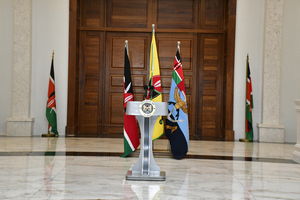Why vice chancellors oppose merger of varsities

The University of Nairobi is technically insolvent. The government plans to restructure public universities. PHOTO | FILE | NATION MEDIA GROUP
What you need to know:
- They are also opposed to the plan to fire staff and instead want more lecturers hired in order to increase lecturer-student ratio.
- Vice chancellors say that the current challenge is not the number of universities or programmes as such but the level of funding by the government.
The vice chancellors of public universities have rejected a plan to merge their institutions to cut on management costs in their proposal to Education Cabinet Secretary George Magoha, setting stage for a showdown.
In a 60-page document submitted to Prof Magoha, the vice chancellors of 31 public universities have put up a strong case on why the country needs more universities and not less.
The administrators who were given two weeks last month by Prof Magoha to agree on how the merger of the universities will be done, now want the institutions to be increased to 100 saying by 2030, close to one million students will be joining universities.
The Commission for University Education (CUE) is also working differently on a proposal on merging of the universities, and its report will be submitted to Prof Magoha by Wednesday.
REFORMS
The government has already indicated that some universities have to go, a move that has not gone down well with vice chancellors, who want to keep their jobs.
“University reforms are critical at this stage. We shall review all the university public financial and management systems, appraise ongoing projects with a view to restructuring them and implement radical measures that will include merger or closure of some universities and university campuses that are not able to sustain their operations against the number of students admitted or degree offered,” said National Treasury Cabinet Secretary Henry Rotich last month before he was replaced this week by Ukur Yatani after he was charged in court with corruption allegations.
However, Universities Academic Staff Union (Uasu) has moved to court to challenge the merger saying it is not being done following the law.
AUSTERITY
The hearing of the case is set for August 1. “The merger is not a priority for the university sector save for enhancing support and improving from all fronts,” the vice chancellors committee task force recommends.
They are also opposed to the plan to fire staff and instead want more lecturers hired in order to increase lecturer-student ratio. Universities have 27,000 staff including 9,000 lecturers.
The universities also want the government to increase funding to the institutions from the current Sh97 billion but, they have not indicated how much they want.
“The funding of the universities should be based on the student numbers and national priorities. Furthermore, taxpayers' money should follow public and not private enterprise that are usually audited to confirm prudent utilisation of such funds,” the report says.
FUNDING
The vice chancellors further say it is important to note that the current challenge is not the number of universities or programmes as such but the level of funding by the government.
They say the relatively older and bigger universities are most affected in terms of inability to meet financial obligations thus, the merger plan will not be the cure.
“Both public and private universities should continue to optimise and rationalise both programmatic areas and staffing. This will allow room for consolidation even as we expect a 100 percent transition by 2030 of the number of students being admitted into universities."





